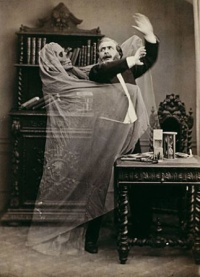Illusionism (art)
From The Art and Popular Culture Encyclopedia
|
Related e |
|
Featured: |
Illusionism in art history means either the artistic tradition in which artists create a work of art that appears to share the physical space with the viewer., or more broadly the attempt to represent physical appearances precisely - also called mimesis. The term realist may be used in this broader sense, but that also has a rather different meaning. Illusionism encompasses a long history, from the deceptions of Zeuxis and Parrhasius to the works of muralist Richard Haas in the twentieth century, that includes trompe-l'oeil, anamorphosis, Op art, Abstract Illusionism, and Illusionistic ceiling painting techniques such as di sotto in sù and quadratura. Sculptural illusionism includes works, often painted, that appear real from a distance. Other forms, such as the illusionistic tradition in the theatre, and Samuel van Hoogstraten's "peepshow"-boxes from the seventeenth-century, combine illusionistic techniques and media.
In his writings and art criticisms during the mid-1960s art critic/artist Donald Judd claimed that illusionism in painting undermined the artform itself. Judd implied that painting was dead, claiming painting was a lie and because it depicted the illusion of 3-dimensions on a flat surface. Judd claimed that painting needed to recognize its objecthood in real space and reject illusion. Donald Judd wrote in “Specific Objects” in 1965:
- "Three dimensions are real space. That gets rid of the problem of illusionism and of literal space, space in and around marks of color… Actual space is intrinsically more powerful and specific than paint on a flat surface.


